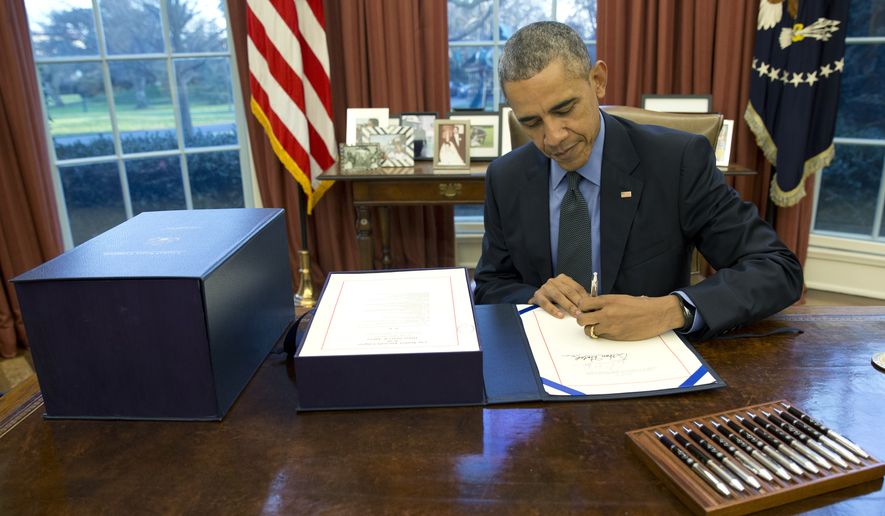The administration issued a record amount of heft in the federal rule book in 2015 as President Obama’s team, carrying out his orders to work around Congress, pushed his expansive government agenda on environmental, labor and Wall Street policy.
With one day to go, the administration added 81,611 pages to the Federal Register, according to the Competitive Enterprise Institute’s count of the official record-keeping digest of federal agencies’ rule-making. It’s the highest total on record and the third time Mr. Obama has crossed the 80,000-page level during his presidency, the institute’s Clyde Wayne Crews calculated.
“This is the pen and phone era, and the president has made clear he’s going to go around Congress when he gets the chance,” Mr. Crews said. “We expected Congress to do something about it, but it didn’t.”
Instead, it was the federal court system that challenged the executive branch in 2015, and Mr. Obama was dealt several significant defeats in front of judges who shut down two of his biggest initiatives: to rewrite immigration law and to extend the hand of the federal government to permitting decisions throughout the country.
The White House Office of Management and Budget, which oversees federal agencies’ rule-making, did not respond to a message seeking comment on the Competitive Enterprise Institute’s numbers, nor on the legal defeats judges delivered to Mr. Obama this year.
All told, the administration has proposed 2,334 rules and finalized 3,378 rules and regulations during the year, Mr. Crews said.
Among several that made headlines was the Food and Drug Administration’s proposal in December to ban people younger than 18 from using tanning beds. Others were particularly hefty and covered major parts of the U.S. economy, including the Federal Communications Commission’s net neutrality policy and the Environmental Protection Agency’s clean power plan and its effort to extend its power over land-use decisions through its Waters of the U.S. rule.
Mr. Crews said the size and scope of the regulations are beyond anything seen before. He said with the exception of President Reagan, who managed to limit the Federal Register to under 50,000 pages of new rules and regulations per year, the recent level has usually been around 70,000. But under Mr. Obama it’s been hovering around 80,000.
That means more government rules constraining businesses and private citizens’ decisions — and acting as a brake on the economy, he said.
“Just the sheer volume, the size of the Federal Registry, has never been this high,” he said. “The government always grows, but we’re seeing something unique here.”
Most of the attention in Washington is focused on Congress and lawmaking, but academics and legal scholars are increasingly debating the role of federal agencies and whether the executive branch should have such a concentration of power.
With thousands of rules issued a year, compared with only several hundred bills from Congress, the amount of action coming from the executive branch is hard to track, Mr. Crews said.
Congress, with Republicans now in control of both chambers, has tried to push back. The massive spending bill Congress cleared this month included provisions preventing the IRS and the Securities and Exchange Commission from releasing new political campaign finance rules.
The House next week will vote on a bill requiring agencies to post short online summaries of complex rules and to submit monthly reports to the OMB about rules they expect to finalize.
But lawmakers have had less luck overturning rules that Mr. Obama already has released.
Just before adjourning this year, Congress passed resolutions disapproving of two EPA rules designed to force states and power plants to reduce their greenhouse gas emissions. But Mr. Obama vetoed both of those resolutions, and Congress is unlikely to be successful in overriding him, meaning his plans will remain in effect.
Earlier in the year, Congress passed a measure to overturn rules from the National Labor Relations Board that employers said would allow labor unions to force “ambush” elections. Mr. Obama vetoed the bill, and Congress failed to override the veto.
The Senate in November passed a measure to overturn the Waters of the U.S. rule, which extends the regulatory power of the EPA and the Army Corps of Engineers to millions of acres of land where the government says runoff could affect major waterways.
The House has yet to take up that measure, but the courts stepped in, with a federal appeals court blocking the policy nationwide in an August ruling.
The majority in the 2-1 ruling by the 6th U.S. Circuit Court of Appeals said the government never bothered to propose the distance from a major water source land would need to be to escape federal monitoring.
That was one of several big losses for the administration’s regulatory agenda this year. The biggest, however, was on immigration, where Mr. Obama’s deportation amnesty, announced through “guidance” memos issued by Homeland Security in November 2014, was struck down just two days before it was to go into effect in February.
The judge in that case said Mr. Obama broke the law by short-circuiting the usual public notice-and-comment requirements required when the administration changes major policies.
A federal appeals court agreed and went even further, saying that granting work permits and future stays of deportation to millions of illegal immigrants also violates the Immigration and Nationality Act itself.
Mr. Crews said the immigration actions are part of a trend in which the executive branch is increasingly using guidance and memos — or what he calls “regulatory dark matter” — to avoid even the low requirements of notice and comment for policy changes.
The Government Accountability Office, which is Congress’ chief watchdog, said in a 2012 report that when it came to major rules — those with far-reaching economic impact — the government short-circuited the process nearly 70 percent of the time.
• Stephen Dinan can be reached at sdinan@washingtontimes.com.




Please read our comment policy before commenting.